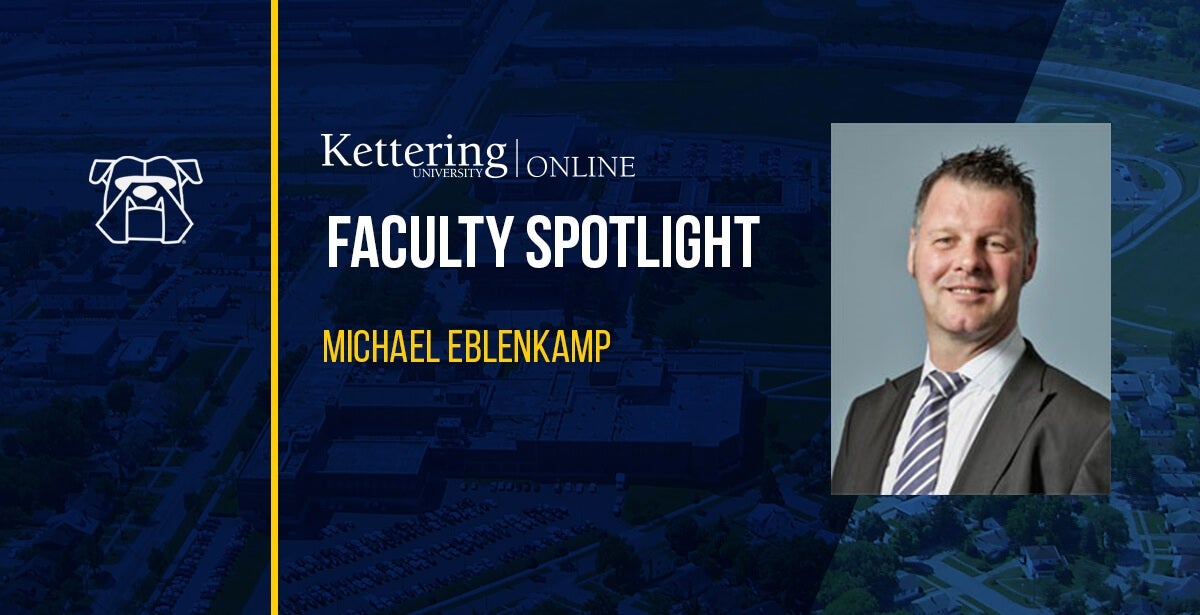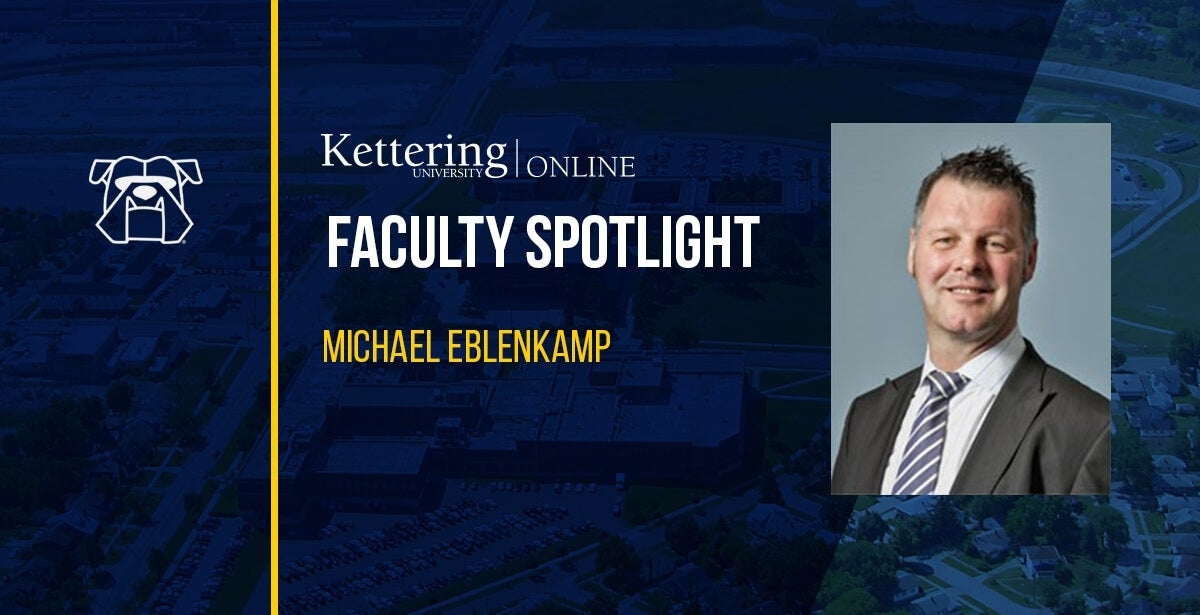
Faculty Spotlight: Michael Eblenkamp
As Kettering University Online’s (KUO) Program Development Manager and Senior Instructional Designer, I have the pleasure of working with our contributing faculty members, many of whom are subject matter experts for the courses they teach. Coming from a wide range of educational and career backgrounds, KUO faculty are united in the effort to link transformative experiential education to rigorous academic standards with real-world applications for learning that lasts a lifetime.
This time, I talk with Michael Eblenkamp. Michael received his Master's degree in Vehicle Engineering – Mechanical Engineering from the "Technical University in Munich, Germany in 1993. There, he majored in Body Design and Engineering and worked with BMW for his thesis "Design and Engineering of an Airbag Test Rig.”
The following are excerpts of my conversation with Michael:
JL: Tell us a bit about your professional background.
ME: I started as a Test Engineer, became a Test Manager, and then was promoted to Head of the Prototype and Tool Shop, all in Seating (car seats) for Keiper Recaro in Germany, from 1993 to 2001. The company sent me on a foreign three-year assignment to be an Engineering Manager and then Director of Engineering. After 16 years, I changed companies and started to focus on more of a business career. Some positions I held were Director of Product Management and Vice President of Sales and Program Management. I left Seating and became familiar with powertrain components and was President/General Manager for Elringklinger, the founder and inventor of the cylinder head gasket. I spent a couple of years having my own consulting business and now, in addition to teaching for KUO, I am the Vice President of Global Program Management at Akebono, a Japanese supplier for brake systems and components.
JL: How did you come to teach for KUO and what is your teaching philosophy?
ME: I was always interested in teaching at a high-level, renowned university, with an excellent engineering reputation. A friend and Kettering University Alumna, referred me to KUO - as we knew each other through the automotive industry. I have been teaching a variety of courses with KUO since Feb. 2016. Aside from teaching the individual course content with a disciplined, structured, and very logical approach, I always try to focus on the "practical effect", based on my long-term engineering and management career in the automotive industry. I do this by preparing the students for how they are likely to be perceived by their manager or supervisor in terms of both performance and efficiency.=
JL: What do you think are some unique challenges of managing engineers?
ME: Engineers are often inclined to focus too much on the technical solution. I encourage them to focus also on the financial aspects and the financial performance of the product. I encourage them to make and design products as competitively as possible! I also tell them to not be so introverted and be a team player as much as possible because today’s solutions and results are achieved only as a team. I talk to them about the balance between being a subject matter expert and a technical leader. Striking the perfect balance can get you very far in your career.
JL: What do you hope students take from your courses to apply to their work?
ME: My extremely logical approach; everything has to make sense, so that everybody, including those who are not experts, can follow any stated detail. Also, being able to present themselves professionally in front of supervisors and/or executive management. I encourage them to ask themselves questions such as “How am I going to be perceived with this document or presentation?” “Who is my audience?” “What do they want to hear? and “What are the next steps? I tell students to be results and summary driven, to “close the loop!” I explain that if you state a problem or goal in the beginning; close the loop by responding exactly to THAT problem or goal. Be clear about where do you stand with the answer. If you do not have a full answer, explain what the next steps are in order to get the answer. Use the ‘who does what by when and why’ approach to logic. If you always ask these questions, you will be surprised how far you can get, and how fast you are going to be perceived as a leader.
JL: What do you see as being the top three characteristics or qualities that employers are looking for in their employees and how do you think a Kettering University Online education meets this need?
ME:
- Be a team player with a professional attitude, being open to other opinions, counterpoints, or proposals
- Have passion and drive! Ambition, commitment, and dedication. Be a go-getter with a can-do (not cannot do or should do) attitude for solving problems.
- Represent value to an organization, so they become profitable, successful, and sustainable in their commitment to the business, communities, and the environment. The better and to a higher level, those criteria can be achieved, the more motivated the employee is and the longer he or she is likely to stay with the particular company, and the happier and more satisfied he or she will be with his or her performance and contribution.
JL: Share one fun fact about yourself or share some things you like to do when you are not teaching
ME: Not a lot of people know this, but my performance as a student in Munich was horrible. I was a very low performing student, not because I was lazy, but because it was so extremely difficult and demanding. After 4 years, I failed one course for the third time. Once written and executed, I thought I failed it again, which would have been the end of my engineering career. So, I started literally walking to the University of Music and Performing Arts in Munich to ask how to subscribe and register. My second career would have been in music, as I have a 10-year piano playing education and did my third major in high school in music. Luckily, I passed with a C plus. Besides playing the piano, I drive high performing sports cars on racetracks and became a professionally licensed high-performance driving instructor.
KUO honors and appreciates Michael Eblenkamp for his contributions and highly regarded work with students. Professor Eblenkamp demonstrates that tenacity and perseverance can make a difference in one’s career.

